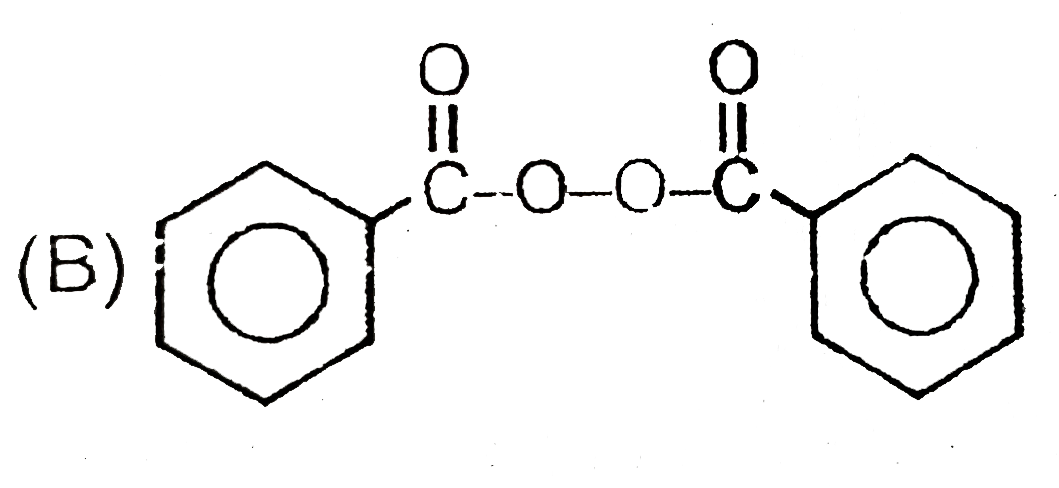Which of the following is radical intiator

All
The correct Answer is:D
To determine which of the given options is a radical initiator, we need to understand what a radical initiator is. A radical initiator is a compound that can generate free radicals upon decomposition, usually through heating or other means. These free radicals can then participate in further chemical reactions.
1. Understand the Definition of Radical Initiators:
- Radical initiators are compounds that can produce free radicals when they decompose. This decomposition often occurs with slight heating or under specific conditions.
2. Analyze Each Option:
- Option A: This compound can decompose upon gentle heating to form free radicals and nitrogen gas (N2). Therefore, it can act as a radical initiator.
- Option B: This is a peroxide compound. Peroxides are known to decompose to form free radicals. When heated, it can generate two free radicals, making it a radical initiator.
- Option C: This is another peroxide compound. Similar to option B, upon gentle heating, it can cleave to produce free radicals. Thus, it can also serve as a radical initiator.
- Option D: Since options A, B, and C can all act as radical initiators, option D states that all of them can be used as radical initiators.
3. Conclusion:
- All the options provided (A, B, C) can generate free radicals upon decomposition. Therefore, the correct answer is D. All of them can be used as the radical initiator.
- Radical initiators are compounds that can produce free radicals when they decompose. This decomposition often occurs with slight heating or under specific conditions.
- Option A: This compound can decompose upon gentle heating to form free radicals and nitrogen gas (N2). Therefore, it can act as a radical initiator.
- Option B: This is a peroxide compound. Peroxides are known to decompose to form free radicals. When heated, it can generate two free radicals, making it a radical initiator.
- Option C: This is another peroxide compound. Similar to option B, upon gentle heating, it can cleave to produce free radicals. Thus, it can also serve as a radical initiator.
- Option D: Since options A, B, and C can all act as radical initiators, option D states that all of them can be used as radical initiators.
- All the options provided (A, B, C) can generate free radicals upon decomposition. Therefore, the correct answer is D. All of them can be used as the radical initiator.
Topper's Solved these Questions
- BOOK - RESONANCE ENGLISHCHAPTER - BIOMOLECULESEXERCISE - Ex-2(More correct)Part-II14videos
BIOMOLECULES
- BOOK - RESONANCE ENGLISHCHAPTER - BIOMOLECULESEXERCISE - Ex-2(Comprehension)Part-IV5videos
BIOMOLECULES
- BOOK - RESONANCE ENGLISHCHAPTER - BIOMOLECULESEXERCISE - Ex-2(Subjective)Part-I20videos
BIOMOLECULES
- BOOK - RESONANCE ENGLISHCHAPTER - BASIC CONCEPTSEXERCISE - ORGANIC CHEMISTRY(BASIC CONCEPTS)27videos
BASIC CONCEPTS
- BOOK - RESONANCE ENGLISHCHAPTER - BIOMOLECULES & POLYMEREXERCISE - ORGANIC CHEMISTRY(Biomolecules & Polymer)34videos
BIOMOLECULES & POLYMER
Similar Questions
Knowledge Check
- Question 1 - Select One
Which of the following free radicals is responsible for causing break down of ozone into oxygen due to use of CFCs ?
AOBClCCH3DOH - Question 2 - Select One
Which of the following is the free radical chain reaction?
A2CH3I+2Na→CH3−CH3+2NalBCH4+Cl2hv−−→CH3Cl+HClC DAll of the above
DAll of the above - Question 3 - Select One
Which of the following is a characteristic feature of a free radical?
AIt has a positive chargeBIt has a negative chargeCIt has all paired electrons.DIt has an unpaired electron.
Which of the following radical does not liberate gas with (Zn+dil. HCl) on warming?
View SolutionWhich of the following will act as inhibitor in free radical addition polymerisation?
View SolutionWhich among the following free radicals is most stable
View SolutionWhich of the following anion(s) is/are interfering radicate ?
View SolutionWhich of the following radicals evolve gas or vapour when treated with dil HCl?
View Solution

